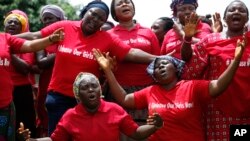ABUJA —
Nigerian police said on Tuesday that protesters were free to march in the capital Abuja, after an uproar over comments by the police commissioner in which he appeared to ban demonstrations over more than 200 schoolgirls kidnapped by rebels.
Joseph Mbu made a statement on Monday in which he appeared to forbid protests on grounds that they could be hijacked by “dangerous elements” who could threaten state security. Protesters said they would challenge the ban in court on Tuesday, and they filed a complaint.
But a statement from Police Spokesman Frank Mba on Tuesday said the commissioner had only meant to advise against gatherings because of intelligence that there was “infiltration and hijack of otherwise innocuous and peaceful protests by some criminal elements having links with insurgents”.
“The Force has not issued any order banning peaceful assemblies/protests anywhere in Nigeria,” Mba said.
“However, ... citizens are strongly advised to reconsider their positions on the issues of rallies and protests in FCT until the existing threats are appropriately neutralised,” he said, referring to the Federal Capital Territory around Abuja.
The girls were snatched from the northeastern village of Chibok, near the Cameroon border, on April 14.
Much of the anger among protesters, and a #BringBackOurGirls Twitter campaign that helped fuel it, has been directed towards the government for failing to protect the girls. A Reuters investigation showed that there were a number of missteps along the way, including failure to respond to a distress call hours in advance.
President Goodluck Jonathan's supporters say the protesters' anger should be directed at Boko Haram, and that constant criticism of the military is misplaced and demoralizing.
The girls' plight has shone the international spotlight on a violent 5-year-old battle for an Islamic state by insurgents who have killed thousands since 2009. At least 530 civilians have been killed by the militants since the day of the abduction.
U.S. troops are in neighboring Chad on a mission to find them. Britain and France have also offered help.
Nigerian authorities argue they face an unenviable dilemma: if they try to free the girls, they risk some getting killed, or if they offer money or a prisoner swap, this would only leave the rebels stronger, endangering more lives in the long run.
A reluctance to pursue either strategy has created a stalemate, officials say.
Joseph Mbu made a statement on Monday in which he appeared to forbid protests on grounds that they could be hijacked by “dangerous elements” who could threaten state security. Protesters said they would challenge the ban in court on Tuesday, and they filed a complaint.
But a statement from Police Spokesman Frank Mba on Tuesday said the commissioner had only meant to advise against gatherings because of intelligence that there was “infiltration and hijack of otherwise innocuous and peaceful protests by some criminal elements having links with insurgents”.
“The Force has not issued any order banning peaceful assemblies/protests anywhere in Nigeria,” Mba said.
“However, ... citizens are strongly advised to reconsider their positions on the issues of rallies and protests in FCT until the existing threats are appropriately neutralised,” he said, referring to the Federal Capital Territory around Abuja.
The girls were snatched from the northeastern village of Chibok, near the Cameroon border, on April 14.
Much of the anger among protesters, and a #BringBackOurGirls Twitter campaign that helped fuel it, has been directed towards the government for failing to protect the girls. A Reuters investigation showed that there were a number of missteps along the way, including failure to respond to a distress call hours in advance.
President Goodluck Jonathan's supporters say the protesters' anger should be directed at Boko Haram, and that constant criticism of the military is misplaced and demoralizing.
The girls' plight has shone the international spotlight on a violent 5-year-old battle for an Islamic state by insurgents who have killed thousands since 2009. At least 530 civilians have been killed by the militants since the day of the abduction.
U.S. troops are in neighboring Chad on a mission to find them. Britain and France have also offered help.
Nigerian authorities argue they face an unenviable dilemma: if they try to free the girls, they risk some getting killed, or if they offer money or a prisoner swap, this would only leave the rebels stronger, endangering more lives in the long run.
A reluctance to pursue either strategy has created a stalemate, officials say.





